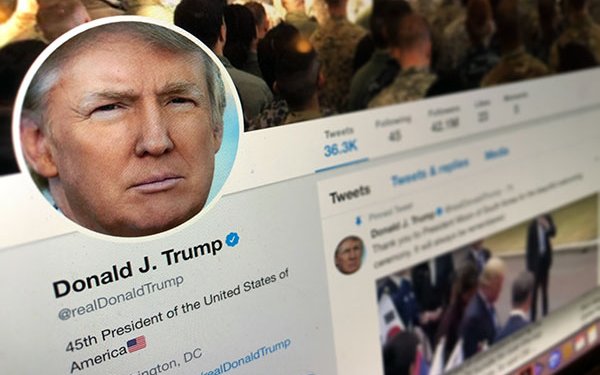
President Donald Trump should simply "mute"
Twitter followers he finds objectionable instead of blocking them. That's the very strong suggestion of U.S. District Court Naomi Reice Buchwald in New York, who is presiding over a lawsuit brought
against Trump by when seven blocked Twitter users and Columbia University's Knight First Amendment Institute.
"I don't quite know why we're here," Buchwald told lawyers from the Department of
Justice and the Knight Institute Thursday morning. "Don't we have a solution that serves the interests of (the parties)?"
Her comments came during a two-hour argument over whether Trump, who
tweets from the @realDonaldTrump account, violates the First Amendment by blocking critics on Twitter. The Knight Institute sued Trump and his social media director, Dan Scavino, over the blocks last
July, arguing that the @realDonaldTrump account is a "public forum" -- meaning it's comparable to city streets, parks and other locales where the government can't prevent people from speaking based on
their views. The users want Buchwald to declare the blocks unconstitutional, and to order the White House to unblock them.
Twitter users who are blocked from Trump's account can't view his
tweets or replies while logged in; if those users sign out of Twitter, they may still be able to view the posts. Blocked users are also restricted from commenting in some threads -- though there are
workarounds.
The Knight Center argues that Trump's Twitter account is comparable to a digital town hall, where government officials aren't allowed to exclude people based on their political
views.
DOJ lawyer Michael Baer countered this morning that the town hall comparison isn't on point, given that blocked Twitter users can continue to interact with other Trump followers. "I
don't think we can decide this case on real-world analogies alone," he said.
Baer specifically argued added that Trump's blocks don't prevent users from either reading Trump's tweets or
discussing them in other users' threads.
Buchwald appeared skeptical of that argument, noting that the Twitter blocks can affect users beyond just those who are blocked.
"Other
constituents are not able to engage in the cross-communication that Twitter is known for," she said. "It is not the case that the only person harmed by blocking is the blockee."
She also said
that if Trump's account is considered a public forum, he wouldn't be able to block people based on their views. "Once it's a public forum, you can't shut somebody up because you don't like what
they're saying," she said.
Buchwald proposed several times that the parties could resolve the lawsuit if Trump used Twitter's "mute" feature.
"Isn't the answer that he just mutes the person he finds
personally offensive?" she asked.
Knight Center attorney Katie Fallow suggested in her response that muting would have been preferable to blocking them, but that even muting users could
prevent them from expressing their complaints to Trump via Twitter. (The Knight Center argued in court papers filed last December that muting would have "spared the President from having to encounter
the individual plaintiffs’ responses and criticisms," but would not have hindered the users from accessing tweets or interacting with other commenters.)
Buchwald urged both sides to
accept her proposed resolution rather than continue to litigate. "There is always a risk that you could lose," she said. "You don't necessary want to risk law being made that you don't want on the
books."